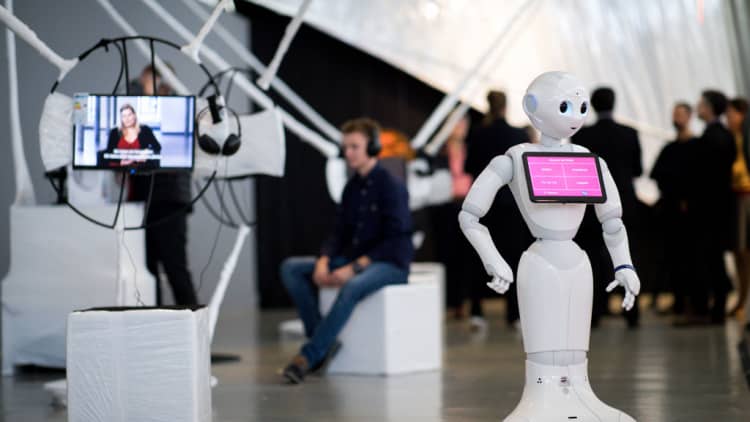DUBAI — The U.S.'s concerted campaign against Chinese tech companies, particularly telecommunications giant Huawei, isn't stopping allies like the United Arab Emirates from making use of their technology.
This was evident during the country's inaugural AI Everything summit held this week in Dubai, which hosted delegates from companies around the world including the American heavyweights Google, IBM, Microsoft as well as Chinese rivals Alibaba, SenseTime and Huawei.
As the small Gulf nation strives to diversify its economy and enhance ease of doing business, its government is pushing for the broad implementation of artificial intelligence into everyday life, governance and business operations. To that effect, it's welcomed the partnership of a wide spectrum of companies and countries, decidedly declining to take sides in what many have described as the global AI race between China and the U.S.
"I don't believe it's a concern for our government, especially as we are managing that relationship very carefully," Aisha bin Bishr, director general of Smart Dubai, the government body leading Dubai's AI roadmap, told CNBC's Dan Murphy during the event.
"You cannot stop implementing technologies just because of some negative flags flagged externally — you need to take that risk and calculate it, be ready for anything to happen during that journey, and we work very closely with our chief security officers," she said.

'Calculating the risk' of AI partnerships
Dubai has long prided itself on being an "oasis of security" for businesses amid a turbulent region. As the U.S. government warns of security risks associated with Huawei — which U.S, U.K. and Australian intelligence officials accuse of being a potential tool of Chinese state surveillance — Dubai remains open for business with the tech firm.
But this is not without a careful calculation of risk, bin Bishr said.
"Security and safety have always been an integral component in all our strategies. We don't want to compromise on the one thing Dubai has been known for, as a safe oasis in this region -- we need to study it very well to understand all these kinds of security alerts or back doors, and calculate the risk."
Washington's warnings have been bolstered by the recent admission from UK telecoms provider Vodafone that it found security flaws in Huawei equipment in 2011 and 2012. Asked whether the warnings raised concern, bin Bishr replied, "Absolutely."
Huawei rejects accusations that it could provide a back door to state spying. But many experts remain skeptical, pointing to a Chinese law that mandates all domestic companies to assist the government in intelligence gathering if Beijing requests it.

In February, Emirati telecoms operator Etisalat chose Huawei to deploy the 5G network in the country this year. 5G, the fifth-generation wireless network, promises faster speeds and lower latency and is expected to transform industries like the internet of things and autonomous vehicles.
"Today we want to implement 5G network in the Dubai Expo 2020 district, we are working very closely with these companies to test their networks and how ready and mature they are to launch it during Expo 2020," bin Bishr said, referring to Dubai's hosting of next year's World Expo. "And there is no harm to pilot things within a secure ecosystem to understand what are the positive and negative components of these technologies."
Government leading the charge
A recent study by consulting firm PwC estimated that AI could add $122 billion to the UAE's economy by 2030. Along with a national AI strategy targeting a 35% increase in AI's contribution to national GDP (gross domestic product), the UAE is also the first country in the world to boast an AI minister, 29-year-old Omar bin Sultan Al Olama.
Common feedback among private sector guests attending AI Everything was that of praise for the public sector backing of AI initiatives in the UAE. The primary challenge at this point, many told CNBC, will be the development and attraction of talent.
Ethics experts and privacy advocates also worry about the potential abuse of data by state actors, a concern bin Bishr said is being met by government initiatives like Smart Dubai's recently published guidelines on the ethical use of AI.
—CNBC's Elizabeth Schulze contributed to this report.


